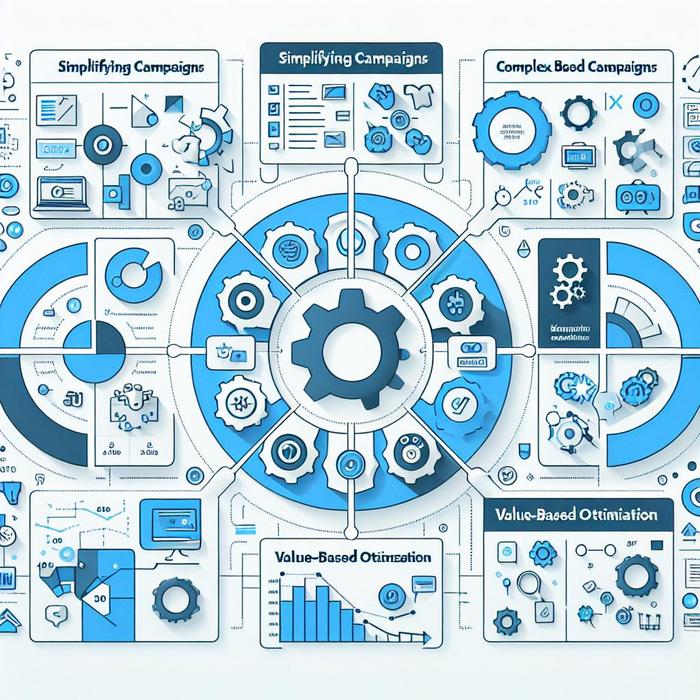How Does Simplifying Complex Campaigns Elevate Business Strategies?
Data-driven marketing strategies are critical. They provide a unique competitive edge, especially when complexity comes into play. But is there a remedy to navigate these labyrinthine campaigns? Yes, the powerful tool of value-based optimization emerges as a potent solution.
Understanding Value-Based Optimization
Value-based optimization is a technique that refocuses marketing strategies on the customer’s value, shifting away from traditional cost-center models. It helps to engineer business strategies by identifying and prioritizing the most valuable customers, thereby maximizing return on ad spending (ROAS). By tapping into this practice, executives can simplify complex campaigns and achieve tangible results.
Benefits of Value-Based Optimization
- Streamlined decision-making process
- Enhanced customer value
- Improved ROAS
- Advanced targeting for advertising campaigns
- Data-driven performance analytics
Indeed, it provides a comprehensive overview of the customer journey, leading to improved decision making. Enhanced advertising efficiency is often an immediate outcome of this insightful strategy. For example, Google’s Smart Bidding, an automated bid strategy that uses machine learning to optimise for conversions, is a great tool to leverage. It underscores how you can reap substantial benefits from integrating Google’s Smart Bidding into your campaign management.
Value-Based Optimization at Work
A significant transformation occurs when companies shift their strategic focus towards value-based optimization. By emphasizing customer value, businesses can identify and segment the most profitable customer categories more effectively. A deep understanding of customer behaviour and preferences can be a real game-changer, bolstering brand loyalty and stimulating revenue growth.
Moreover, value-based optimization plays a crucial role in simplifying complex campaigns. In a LinkedIn post by a marketing expert, the author showcases how he simplified a lead generation account using this approach. The results were nothing short of remarkable, with reduced costs and increased leads serving as compelling evidence of value-based optimization’s effectiveness.
Unleashing the Full Potential of Value-Based Optimization
Incorporating value-based optimization into your marketing strategy might seem challenging, but the rewards are well worth the effort. Harnessing the power of data analytics and AI, you can practice machine learning to optimize marketing performance. Tailoring your strategy to focus on high-value customers can significantly boost your ROAS.
Looking to maximize campaign efficiency further? Consider integrating smarter bidding and budgeting tools recommended by Kroger Precision Marketing.
Value-based optimization isn’t just about simplifying campaigns, it’s about leveraging data-driven insights to sharpen your marketing edge. It paves the way for a future where informed decision-making and strategic business growth become standard practice. The world of marketing is evolving, and value-based optimization is leading the charge.
The Role of Data Analytics and AI in Value-Based Optimization
Embracing technologies like data analytics and Artificial Intelligence (AI) has become pivotal. Data analytics provides the power to harvest valuable customers’ insights, facilitating the creation of personalized marketing strategies that resonate better with target audiences. At the same time, AI helps automate and streamline complex processes, freeing up marketing teams to focus on more strategic activities like campaign ideation and customer relationship management.
A blend of these two potent technologies allows marketers to practice machine learning for campaign optimization. By implementing AI models trained with historical data, marketers can predict future customer behavior. As a result, they can create proactive marketing strategies striving to meet the customer’s expectation, thus optimizing their value. Indeed, a deeper understanding of mastering machine learning is paramount to reap benefits from AI-led marketing innovations.
How Value-Based Optimization Shapes Marketing Budgets
Another significant merit of the value-based optimization strategy lies in its capacity to frame adequate marketing budgets and spending. It helps identify the most valuable customer segments, enabling marketers to target them meticulously and thereby maximizing the ROI. Furthermore, implementing a data-driven model based on value-based optimization provides a real-time picture of advertising campaign performance. This dynamic perspective aids in adjusting marketing resources allocation effectively, ensuring that each invested dollar brings the best return possible.
The Future of Advertising: Predictive Analytics
The next frontier for advertisers will be predictive analytics. This technique uses historical data to forecast future trends, a key factor in shaping successful marketing strategies. By leveraging predictive analytics, advertisers can not only anticipate customer behavior better but can also optimize their marketing efforts in a way that caters most effectively to these projected behaviors. The shift in focus from reactive to proactive strategies gives marketers an upper hand (ScienceDirect).
Turning Insights into Actions
Value-based optimization and data-driven marketing is not solely about gleaning valuable insights from data. The true power of these strategies lies in transforming these insights into actionable steps that enhance customer value and maximize returns. This approach involves an ongoing process of learning, tweaking, and refining marketing strategies in line with evolving customer behavior patterns and business objectives (Building consumer trust through data-driven insights).
Value-Based Optimization and the Role of C-suite
While the benefits of value-based optimization are clear, its successful implementation requires a decisive role from the executives in the C-Suite. They are responsible for driving the shift towards data-driven strategies, fostering a culture that embraces the use of data, and investing in the necessary technologies and tools. By emphasizing the practice of value-based optimization, leaders can instill a forward-thinking approach, allowing their organizations not only to stay relevant but also to be proactive.
Value-based optimization, indeed, has turned into a key player in driving business growth through strategic investment decisions, ensuring a healthier bottom-line, and fostering lasting customer relationships. By bringing together advanced target-oriented advertising and a superior understanding of customer value, this approach simplifies complex strategies, thereby enhancing business processes at large.

